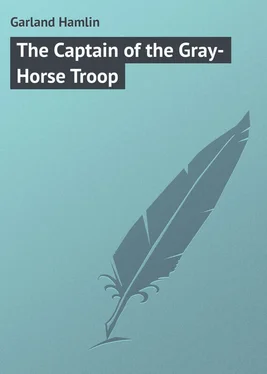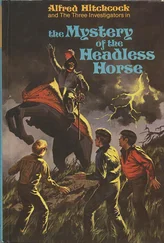Hamlin Garland - The Captain of the Gray-Horse Troop
Здесь есть возможность читать онлайн «Hamlin Garland - The Captain of the Gray-Horse Troop» — ознакомительный отрывок электронной книги совершенно бесплатно, а после прочтения отрывка купить полную версию. В некоторых случаях можно слушать аудио, скачать через торрент в формате fb2 и присутствует краткое содержание. Жанр: foreign_prose, foreign_adventure, на английском языке. Описание произведения, (предисловие) а так же отзывы посетителей доступны на портале библиотеки ЛибКат.
- Название:The Captain of the Gray-Horse Troop
- Автор:
- Жанр:
- Год:неизвестен
- ISBN:нет данных
- Рейтинг книги:3 / 5. Голосов: 1
-
Избранное:Добавить в избранное
- Отзывы:
-
Ваша оценка:
- 60
- 1
- 2
- 3
- 4
- 5
The Captain of the Gray-Horse Troop: краткое содержание, описание и аннотация
Предлагаем к чтению аннотацию, описание, краткое содержание или предисловие (зависит от того, что написал сам автор книги «The Captain of the Gray-Horse Troop»). Если вы не нашли необходимую информацию о книге — напишите в комментариях, мы постараемся отыскать её.
The Captain of the Gray-Horse Troop — читать онлайн ознакомительный отрывок
Ниже представлен текст книги, разбитый по страницам. Система сохранения места последней прочитанной страницы, позволяет с удобством читать онлайн бесплатно книгу «The Captain of the Gray-Horse Troop», без необходимости каждый раз заново искать на чём Вы остановились. Поставьте закладку, и сможете в любой момент перейти на страницу, на которой закончили чтение.
Интервал:
Закладка:
Thereupon Elsie opened her eyes. Not that money was a lure to her, for it was not, but she was eager for notice – for the fame that comes quickly, and with loud trumpets and gay banners. In conversation with Lawson one day she learned that he was about to do some pen-portraits of noted Tetong chieftains, and at once sprang to her opportunity. She admired and trusted Lawson. His keen judgment, his definiteness of speech awed her a little, and with him she was noticeably less assertive than with the others of her artist acquaintances. So here now she sat, painting with rigor and immense satisfaction the picturesque rags and tinsel ornaments of the Tetongs. To her they were beggars and tramps, on a scale with the lazzaroni of Rome or Naples. That they were anything more than troublesome models had not been borne in on her mind.
She had never professed special regard for her uncle the agent – in fact, she covertly despised him for his lack of power – but, now that the issue was drawn, she naturally flew to the side of those who would destroy the small peoples of the earth. She wrote to her father a passionate letter.
"Can't you stop this?" she asked. "No doubt Uncle Henry will go direct to Washington and make complaint. This Captain Curtis is insufferable. I would leave here instantly only I am bound to do some work for Mr. Lawson. We must all go soon, for winter is coming on, but I would like to see this upstart humbled. He treats me as if I were a school-girl – 'declines to argue the matter.' Oh! he is provoking. His sister is a nice little thing, but she sides with him, of course – and so does Lawson, in a sense; so you see I am all alone. The settlers are infuriated at Uncle Sennett's dismissal, and will support you and Uncle Henry."
In the days that followed she met Curtis's attempts at modifying her resentment with scornful silence, and took great credit to herself that she did not literally fly at his head when he spoke of his work or his wards. Her avoidance of him became so painful that at the end of the third day he said to his sister: "Jennie, I think I will go to the school mess after this. Miss Brisbane's hostility shows no signs of relenting, and the situation is becoming decidedly unpleasant."
"George!" said Jennie, sternly. "Don't you let that snip drive you away. Why, the thing is ridiculous! She is here on sufferance – your sufferance. You could order them all off the reservation at once."
"I know I could, but I won't. You know what I mean – I can't even let Miss Brisbane know that she has made me uncomfortable. She's a very instructive example of the power of environment. She has all the prejudices and a good part of the will of her father, and represents her class just as a little wild-cat represents its species. She's a beautiful girl, and yet she is to me one of the most unattractive women I ever knew."
Jennie looked puzzled. "You are a little hard on her, George. She is unsympathetic, but I think she says a lot of those shocking things just to hurt you."
"That isn't very nice, either," he said, quietly. "Well, our goods are on the way, and by Thursday we'll be independent of any one. But maybe you are right – it would excite comment if I left the mess. I will join you all at meals until we are ready to light our own kitchen fire."
Thereafter he saw very little of the artists. By borrowing a few necessaries of his head farmer he was able to camp down in the house which Sennett had so precipitately vacated. He was busy, very busy, during the day; but when his work was over and he sat beside his fire, pipe in hand, Elsie's haughty face troubled him. His life had not taken him much among women, and his love fancies had been few. His duties as an officer and his researches as a forester and map-builder had also aided to keep him a bachelor. Once or twice he had been disturbed by a fair face at the post, only to have it whisked away again into the mysterious world of happy girlhood whence it came.
And now, at thirty-four, he was obliged to confess that he was as far from marriage as ever – farther, in fact, for an Indian reservation offers but slender opportunity in way of courtship for a man of his exacting tastes.
He was not quite honest with himself, or he would have acknowledged the pleasure he took in watching Elsie's erect and graceful figure as she rode past his office window of a morning. It was pleasant to pause at the open door of her studio for a moment and say "Good-morning," though he received but a cold and formal bow in return. She was more alluring at her easel than in any other place, for she had several curious and very pretty tricks in working, and seemed like a very intent child, with her brown hair loosening over her temples, her eyes glowing with excitement, while she dabbed at the canvas with a piece of cheese-cloth or a crumb of bread. She dragged her stool into position with a quick, amusing jerk, holding her brush in her teeth meanwhile. Her blouses were marvels of odd grace and rich color.
The soldier once or twice lingered in silence at the door after she had forgotten his presence, and each time the glow of her disturbing beauty burned deeper into his heart, and he went away with drooping head.
Mrs. Wilcox took occasion one day to remonstrate with her niece. "Elsie, you were very rude to Captain Curtis again to-day. He was deeply hurt."
"Now, aunt, don't you try to convert me to a belief in that tin soldier. He gets on my nerves."
"It would serve you right if he ordered us off the reservation. Your remarks to-day before that young Mr. Streeter were very wrong and very injudicious, and will be used in a bad cause. Captain Curtis is trying to keep the peace here, and you are doing a great deal of harm by your hints of his removal."
"I don't care. I intend to have him removed. I have taken a frightful dislike to him. He is a prig and a hypocrite, and has no business to come in here in this way, setting his low-down Indians up against the settlers."
"That's just what he is trying not to do, and if you weren't so obstinate you'd see it and honor him for his good sense."
"Aunt, don't you lecture me," cried the imperious girl. "I will not allow it!"
In truth, Mrs. Wilcox's well-meant efforts at peace-making worked out wrongly. Elsie became insufferably rude to Curtis, and her letters were filled with the bitterest references to him and his work.
Lawson continued most friendly, and Curtis gladly availed himself of the wide knowledge of primitive psychology which the ethnologist had acquired. The subject of Indian education came up very naturally at a little dinner which Jennie gave to the teachers and missionaries soon after she opened house, and Lawson's remarks were very valuable to Curtis. Lawson was talking to the principal of the central school. "We should apply to the Indian problem the law of inherited aptitudes," he said, slowly. "We should follow lines of least resistance. Fifty thousand years of life proceeding in a certain way results in a certain arrangement of brain-cells which can't be changed in a day, or even in a generation. The red hunter, for example, was trained to endure hunger, cold, and prolonged exertion. When he struck a game-trail he never left it. His pertinacity was like that of a wolf. These qualities do not make a market-gardener; they might not be out of place as a herder. We must be patient while the redman makes the change from the hunter to the herdsman. It is like mulching a young crab-apple and expecting it to bear pippins."
"Patience is an unknown virtue in an Indian agent," remarked the principal of the central school – "present company excepted."
"Do you believe in the allotment?" asked Miss Colson, one of the missionaries for kindergarten work, an eager little woman, aflame with religious zeal.
Читать дальшеИнтервал:
Закладка:
Похожие книги на «The Captain of the Gray-Horse Troop»
Представляем Вашему вниманию похожие книги на «The Captain of the Gray-Horse Troop» списком для выбора. Мы отобрали схожую по названию и смыслу литературу в надежде предоставить читателям больше вариантов отыскать новые, интересные, ещё непрочитанные произведения.
Обсуждение, отзывы о книге «The Captain of the Gray-Horse Troop» и просто собственные мнения читателей. Оставьте ваши комментарии, напишите, что Вы думаете о произведении, его смысле или главных героях. Укажите что конкретно понравилось, а что нет, и почему Вы так считаете.












